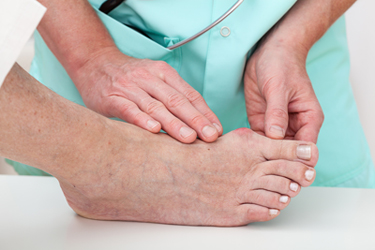 Patients who are afflicted with a bunion may be eligible for bunion surgery. This may be an option to consider when routine methods of relief are ineffective. These can include certain pain medication, wearing specific shoes that are designed to minimize discomfort, or physiotherapy. Having bunion surgery performed may help walking and standing to become easier, in addition to wearing shoes that fit correctly. During bunion surgery, the bone is generally filed down or reset, and this is often helpful in reshaping the foot. If you have a bunion that is affecting your daily routine, it is strongly advised that you are under the care of a podiatrist who can help you to determine if surgery is the correct choice for you.
Patients who are afflicted with a bunion may be eligible for bunion surgery. This may be an option to consider when routine methods of relief are ineffective. These can include certain pain medication, wearing specific shoes that are designed to minimize discomfort, or physiotherapy. Having bunion surgery performed may help walking and standing to become easier, in addition to wearing shoes that fit correctly. During bunion surgery, the bone is generally filed down or reset, and this is often helpful in reshaping the foot. If you have a bunion that is affecting your daily routine, it is strongly advised that you are under the care of a podiatrist who can help you to determine if surgery is the correct choice for you.
If you are suffering from bunions, contact one of our podiatrists of Jill Einhorn, DPM and James Einhorn, DPM. Our doctors can provide the care you need to keep you pain-free and on your feet.
What Is a Bunion?
A bunion is formed of swollen tissue or an enlargement of boney growth, usually located at the base joint of the toe that connects to the foot. The swelling occurs due to the bones in the big toe shifting inward, which impacts the other toes of the foot. This causes the area around the base of the big toe to become inflamed and painful.
Why Do Bunions Form?
Genetics – Susceptibility to bunions are often hereditary
Stress on the feet – Poorly fitted and uncomfortable footwear that places stress on feet, such as heels, can worsen existing bunions
How Are Bunions Diagnosed?
Doctors often perform two tests – blood tests and x-rays – when trying to diagnose bunions, especially in the early stages of development. Blood tests help determine if the foot pain is being caused by something else, such as arthritis, while x-rays provide a clear picture of your bone structure to your doctor.
How Are Bunions Treated?
If you have any questions, please feel free to contact our offices located in Brooklyn and Astoria, NY . We offer the newest diagnostic and treatment technologies for all your foot care needs.